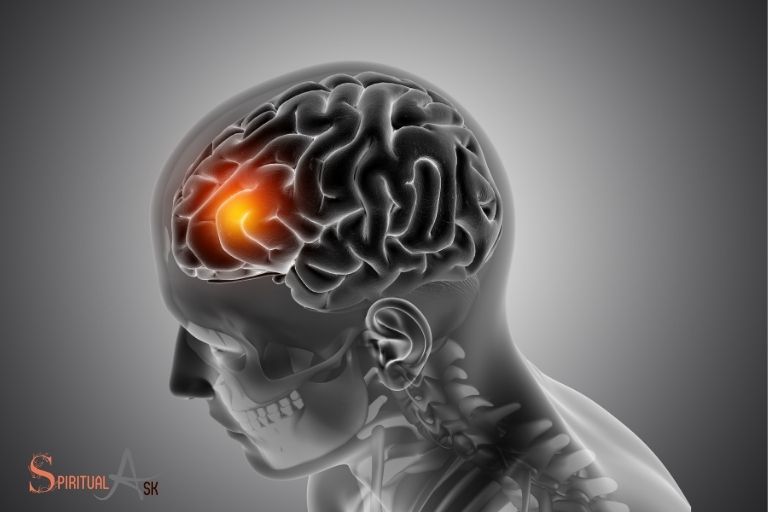Spiritual Awakening And the Brain: Self-Awareness!
A spiritual awakening is a profound shift in consciousness, leading to a deeper understanding of one’s purpose, identity, and connection to the universe.
This transformative process often involves changes in brain function and activity, contributing to the individual’s heightened self-awareness, empathy, and intuitive abilities.
During a spiritual awakening, the brain undergoes changes that affect its structure and function. Studies have linked these shifts to the development of new neural connections, increased activity in certain brain regions, and alterations in brainwave patterns.
As a result, individuals experiencing a spiritual awakening may notice improvements in mental, emotional, and spiritual well-being.
The spiritual awakening process profoundly impacts the brain, leading to a variety of changes that contribute to the individual’s overall well-being.
6 Aspects: Spiritual Awakening And the Brain
| Aspect | Spiritual Awakening | Brain |
|---|---|---|
| Definition | A profound shift in consciousness, characterized by a deeper understanding of one’s interconnectedness with the universe, resulting in spiritual growth. | The complex organ responsible for processing information, emotion, and bodily functions; the center of the human nervous system. |
| Benefits | Enhanced well-being, increased compassion, improved mental clarity, reduced anxiety, greater sense of purpose and fulfillment. | Facilitates learning, memory, problem-solving, communication, emotional regulation, and motor control. |
| Neurotransmitters | Increases in serotonin, dopamine, and oxytocin levels may contribute to feelings of happiness, well-being, and a sense of connection. | Neurotransmitters such as serotonin, dopamine, and norepinephrine play a crucial role in mood regulation, cognition, and motivation. |
| Brain regions | Prefrontal cortex, parietal lobe, and the insula may be activated or altered during spiritual awakening experiences. | Various regions such as the prefrontal cortex, hippocampus, amygdala, and cerebellum play roles in processing emotions, memories, and decision-making. |
| Brain waves | Spiritual awakening may be associated with changes in brain waves, including increased alpha, theta, and gamma waves. | Different brain wave states are associated with various levels of consciousness, such as alertness (beta waves), relaxation (alpha waves), and deep sleep (delta waves). |
| Practices | Meditation, yoga, prayer, and other contemplative practices can help facilitate spiritual awakening by promoting relaxation and self-awareness. | Engaging in cognitive and physical exercises can help maintain and improve overall brain health and cognitive function. |
Key Takeaway

Four Facts About: Spiritual Awakening And the Brain
Spiritual Awakening And Brain Function
Spiritual awakening, also known as spiritual enlightenment, represents an inner transformation that leads to a deeper understanding of the universe and ourselves.
This experience brings inner peace, clarity and a sense of purpose. But what impact does it have on our brains?
In this section, we will explore the effect of spiritual practices on brain function and its implications.
Explanation Of The Effect Of Spiritual Practices On Brain Function
Studies suggest that spiritual experiences can trigger a chemical reaction in the brain, reducing stress, anxiety, and depression. In addition, it can enhance neural connections, improving cognitive functions such as memory, attention, and problem-solving.
Here are some key points that explain the effect of spiritual practices on brain function:
- Meditation, prayer, and mindfulness practices can activate specific areas of the brain, promoting inner peace, compassion, and emotional regulation.
- Spiritual practices can reduce the activity in the default mode network, which is responsible for self-referential thinking and mind wandering. This effect can lead to an improved focus and attention.
- The practice of gratitude and empathy can stimulate the release of dopamine and serotonin, enhancing the sense of well-being and happiness.
- The practice of self-reflection and introspection can increase the activity in the prefrontal cortex, which is responsible for decision-making, planning, and social behavior.
Discussion Of The Relationship Between Meditation And Brain Activity
Meditation is a spiritual practice that involves focusing the mind on a particular object, thought, or activity with the goal of achieving a state of mental clarity and relaxation.
Research shows that meditation can significantly alter the brain’s neural pathways, leading to long-lasting changes in brain function.
Here are some key points about the relationship between meditation and brain activity:
- Meditation can increase cortical thickness in areas of the brain responsible for sensory processing, attention, and executive control.
- Regular meditation practice can reduce the size of the amygdala, the brain’s fear center, leading to a decrease in anxiety and stress.
- Meditation can slow down the brain’s aging process, improving cognitive functions such as memory, attention, and emotional regulation.
- The practice of mindfulness meditation can increase the activity in the anterior cingulate cortex, which is responsible for self-awareness and regulating emotions.
Mention Of Studies That Showcase The Effects Of Prayer And Mindfulness On The Brain
Research on spirituality, prayer and mindfulness practices has shown that they have beneficial effects on brain function, physiology, and behavior.
Here are some studies that showcase these effects:
- A study by the university of wisconsin-madison found that compassion meditation practice can increase activity in brain areas associated with empathy and decrease activity in areas associated with emotional reaction.
- A study by the university of california found that a single 20-minute mindfulness meditation session can reduce anxiety and stress levels.
- A study by the national institute of health found that cognitive-behavioral therapy that incorporates spiritual practices such as prayer and meditation can significantly reduce symptoms of anxiety and depression.
- A study by harvard university found that spiritual practices such as prayer and meditation can activate the parasympathetic nervous system, leading to a reduction of stress hormones and blood pressure.
Overall, research suggests that spiritual experiences, when combined with mindfulness practices such as meditation and prayer, can have a profound impact on our brain function, leading to improved cognitive, emotional and physiological well-being.
The Neurobiology Of Spiritual Experience
Spiritual Awakening And The Brain: The Neurobiology Of Spiritual Experience
Spiritual awakening is a fascinating phenomenon that is believed to affect the brain in unique ways. The neurobiology of spiritual experience explores the relationship between the brain and spirituality. Scientists have discovered that certain areas of the brain, such as the prefrontal cortex and the limbic system, are involved in spiritual experiences. These regions are responsible for regulating emotions, self-awareness, and perception. In fact, research has shown that during deep meditation or prayer, these areas of the brain become highly active, providing a possible explanation for the profound sense of connection and enlightenment that spiritual awakening experiences explained.
In this section, we will explore the role of dopamine and serotonin in spiritual experiences, how the limbic system is impacted, and the relationship between the prefrontal cortex and spiritual experiences.
Overview Of The Role Of Dopamine And Serotonin In Spiritual Experiences
- Dopamine and serotonin are neurotransmitters that are associated with the experience of pleasure, reward, and well-being.
- They play an essential role in the brain’s reward system and can be activated by spiritual experiences.
- Spiritual practices such as meditation and prayer can stimulate the release of dopamine and serotonin in the brain, leading to feelings of bliss and joy.
- Dopamine and serotonin release can also be triggered by the desire to be in union with a higher power.
Examination Of How The Limbic System Is Impacted During Spiritual Experiences
- The limbic system plays a crucial role in regulating emotions and processing stimuli that are associated with reward and pleasure.
- The amygdala, a part of the limbic system, is believed to be involved in regulating emotional responses to spiritual experiences.
- Studies have shown that the amygdala is highly active during spiritual experiences, indicating an increase in emotional processing.
- The limbic system’s activity can also lead to changes in the functioning of the prefrontal cortex, which is responsible for higher-order cognitive functions such as decision-making and self-awareness.
Mention Of The Relationship Between The Prefrontal Cortex And Spiritual Experiences
- The prefrontal cortex plays a vital role in regulating attention, decision-making, and self-awareness.
- It is believed that during spiritual experiences, the prefrontal cortex’s activity decreases, leading to a decrease in self-awareness and ego-centered thinking.
- This decrease in prefrontal cortex activity could be an explanation for the sense of oneness and interconnectedness that is often reported during spiritual experiences.
- Furthermore, studies have shown that long-term spiritual practices such as meditation can lead to structural changes in the prefrontal cortex, resulting in increased emotional regulation and self-awareness.
The neurobiology of spiritual experience is a fascinating field of study that has shed light on how the brain processes and perceives spirituality.
The role of dopamine and serotonin, the impact on the limbic system, and the relationship with the prefrontal cortex all provide unique insights into the role of spirituality in our brain’s functioning.
The Role Of Neuroscience In Spiritual Awakening
Explanation Of The Role Of Neuroscience In Understanding Spiritual Experiences
Spiritual awakening involves sudden changes in cognition, emotions, and behavior. The study of neuroscience can help us understand the neural basis of such changes.
The following are some points that explain the role of neuroscience in understanding spiritual experiences:
- Neuroscience investigates the neural correlates of spiritual experiences in the brain. It seeks to unravel how the brain circuits and networks give rise to self-transcendent states.
- Understanding the neural basis of spiritual experiences can provide insights into the mysteries of consciousness and the nature of reality. It may also help in developing a comprehensive science of mind and spirit.
- Neuroscience can help demystify spiritual practices such as meditation, prayer, and contemplation, and show how they impact brain function and behavior.
- By studying how the brain processes spiritual experiences, neuroscience can inform the development of therapies for mental health conditions such as depression, anxiety, and addiction that may have a spiritual component.
Discussion Of How Functional Mri And Other Techniques Are Used To Study The Brain During Spiritual Experiences
Modern neuroscience techniques allow researchers to study the brain in real-time during spiritual experiences. One of the most popular techniques used in neuroscience to study the brain during spiritual experiences is functional magnetic resonance imaging (fmri).
The following are some points that discuss how fmri and other techniques are used to study the brain during spiritual experiences:
- Functional mri is a non-invasive technique that uses magnetic fields and radio waves to measure changes in blood oxygen levels in the brain, which reflect neural activity associated with mental processes.
- During spiritual experiences, certain brain areas show heightened activity, such as the prefrontal cortex, the insula, and the parietal cortex, among others. These areas are involved in functions such as self-referential processing, attention, emotion, and perception of the body and space.
- By comparing the brain activity during spiritual experiences to that during ordinary states, researchers can identify the neural signatures of self-transcendence and measure their intensity and duration.
- Other neuroscience techniques that are used to study the brain during spiritual experiences include electroencephalography (eeg), magnetoencephalography (meg), positron emission tomography (pet), and single-cell recording. Each method has its strengths and limitations.
Mention Of The Limitations Of And Future Potential For Neuroscience In Studying Spiritual Awakening
Neuroscience has made significant progress in understanding the neural basis of spiritual experiences, but it has some limitations.
The following are some points that mention the limitations of and future potential for neuroscience in studying spiritual awakening:
- Neuroscience alone cannot capture the full complexity and richness of spiritual experiences. These experiences involve not only brain activity but also subjective feelings, cultural contexts, and spiritual traditions.
- The neuroscience of spiritual experiences is in its infancy, and much remains to be discovered and confirmed. Current studies use small sample sizes, and the results may vary across individuals and cultures.
- The integration of neuroscience with other disciplines such as psychology, philosophy, theology, and anthropology can provide a more holistic understanding of spiritual experiences.
- The future potential of neuroscience in understanding spiritual awakening lies in the development of advanced techniques that can measure more subtle and complex brain patterns and in the integration of big-data approaches and artificial intelligence. These developments can provide unprecedented insights into the nature of consciousness, spirituality, and human flourishing.
The Benefits And Challenges Of Spiritual Awakening
Spiritual Awakening And The Brain: The Benefits And Challenges
Spiritual awakening is a personal transformation that involves a profound shift in consciousness. This awakening has benefits and challenges that can affect an individual’s mental health and well-being. During this journey, individuals often experience an increased sense of awareness, deeper connections to their inner selves, and a reevaluation of their life’s purpose. While the path can be enlightening, it may also bring moments of emotional turbulence and self-doubt. Practices like mindfulness, meditation, and even simple routines, such as savoring coffee and mental clarity benefits, can support individuals in navigating this transformative process.
Overview Of The Benefits Of Spiritual Awakening, Including Increased Empathy And Positive Emotions:
- Spiritual awakening leads to an expansion of consciousness, which results in increased empathy and compassion for others.
- Individuals who undergo spiritual awakening experience more positive emotions like joy, peace, and contentment, resulting in increased well-being.
- Spiritual awakening can also lead to a deeper sense of purpose and a greater connection to the universe, resulting in a feeling of oneness with everything.
Discussion Of Common Challenges Associated With Spiritual Awakening, Such As Spiritual Bypassing And Disorientation:
- Spiritual bypassing is a common challenge in which individuals use spiritual practices to avoid dealing with emotional and psychological issues.
- Disorientation is another challenge that occurs when an individual’s existing beliefs and values are challenged, resulting in confusion and uncertainty.
- Spiritual awakening can also result in the confrontation of negative emotions that may have been suppressed, leading to discomfort in the short-term.
Mention Of The Impact Spiritual Awakening Can Have On Mental Health And Well-Being:
- Spiritual awakening can result in improved mental health and well-being, including reduced stress, anxiety, and depression.
- Individuals who undergo spiritual awakening report increased feelings of self-awareness, self-acceptance, and personal growth.
- Spiritual awakening can also lead to the development of healthy coping mechanisms for dealing with negative emotions and life stressors.
Spiritual awakening is a transformative experience that has both benefits and challenges. Individuals who undergo spiritual awakening experience increased empathy, positive emotions, and improved mental health and well-being.
However, they may also experience challenges such as spiritual bypassing, disorientation, and confrontation of negative emotions.
It’s important to remember that these challenges are a normal part of the awakening process and can lead to personal growth and development.
FAQ About Spiritual Awakening And The Brain
How Does Spiritual Awakening Affect The Brain?
Spiritual awakening changes the brain by creating new neural pathways, increasing the blood flow, and forming new connections.
Can Spiritual Awakening Cure Depression?
While spiritual awakening can bring inner peace, it is not a cure for depression but can offer some relief.
What Are Some Common Signs Of Spiritual Awakening?
Some common signs of spiritual awakening include increased empathy, a sense of connectedness, and a desire for inner growth.
Is Meditation An Essential Part Of Spiritual Awakening?
Meditation can be a powerful tool for spiritual growth, but it is not necessary for spiritual awakening.
Conclusion
The concept of spiritual awakening has been explored and studied for centuries. However, it is only in recent years that the relationship between spiritual awakening and the brain has been investigated in scientific research.
The studies conducted so far suggest that certain practices such as meditation, prayer, and mindfulness can have a positive impact on the brain’s structure and functioning, leading to a greater sense of connection and inner peace.
The findings are exciting and offer us a glimpse into the power of our brains to transform in response to spiritual practices.
Whether spiritual awakening truly unlocks our brain’s potential or not remains to be seen, but the emerging research opens up new avenues for exploration in neuroscience and spirituality.
Ultimately, the journey towards spiritual awakening is a personal one, and each of us must find our own path to spiritual growth and understanding.






